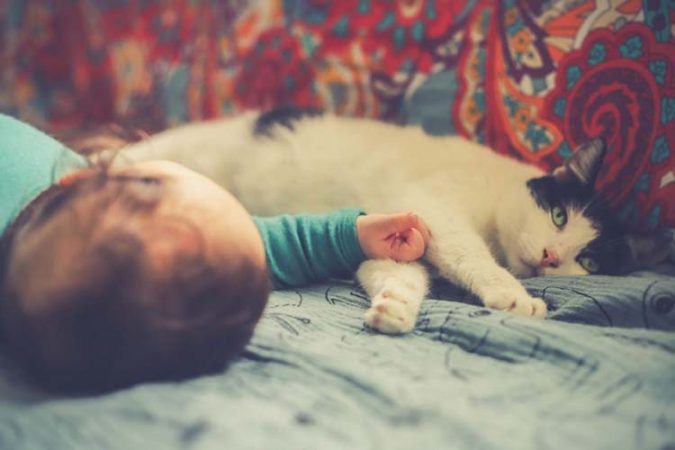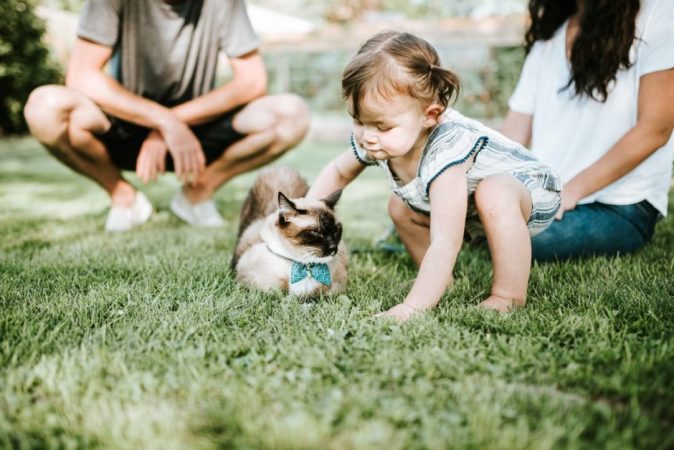
Until now, your dog or your cat was the only one dependent on you in the house, until the arrival of the baby who will change his hierarchy and his habits. You fear for your little one but don’t want to part with your pet, and that’s normal! Some changes and adaptations will allow a very good cohabitation … in all serenity!
Contents
Omum interviewed Veterinarian Valérie Dramard *, consultant in behavioral medicine for cats and dogs for 20 years.
Do animals feel the baby’s arrival?
In the majority of cases, yes. The mother emerges from the beginning of her pregnancy of pheromones perceived by the dog and cat. The arrival of the baby is only in the continuity of things.
And how do we get our animal used to it once the baby is born?
You have to start preparing the animal before birth!
It is best, for example, to test whether the dog is able to cope with frustration, to wait, and not to be in the foreground. Do not give in to all your whims while not being too authoritarian; it is the rule to follow…
When we return from motherhood with the baby, it is normal that this one is in the center of our attention. But a baby sleeps a lot, which leaves time for the animal! There is no question of neglecting the dog walk, but it must be able to be reprogrammed without him experiencing any stress. For a well-balanced dog, this change in habits will happen quite naturally. A well-balanced dog will not experience jealousy or competition.
For the cat, it is necessary to, well before the birth to prohibit access to the future room of the baby so that it does not integrate it into its territory. Indeed, the cat will be all the more anxious when the baby arrives as the changes in its territory will be significant at the same time. Finally, prohibiting access to the baby’s room is also a question of hygiene.
In short, even if the animal is no longer at the center of the couple’s concerns, it is necessary to arrange for it to find its place in the family. For example, arrange a very cozy place for him so that he does not feel the need to go on the sofa and that he does not disturb during the feeding!

Should we leave room for contact between the newborn and the animal?
No, not right away. The animal should not be in direct contact with the baby during the entire first month in any case. This prevents the transmission of diseases to the baby whose immune defenses are weak. It also helps to avoid the risk of kicking or other sudden movements of the animal that could injure the baby.
In addition, the dog-like cat is not comfortable if it is too close to the newborn because it senses its fragility. He will get to know it and recognize it from a distance at the beginning, by the smell and by observing. While mom is still in the maternity ward, you can bring the baby’s clothes back to smell them, but he will smell the baby’s scent on your clothes.
Relationships will be organized all the more easily as the animal observes the child from a distance and sees the parent protecting his newborn and monitoring him very naturally so that he is out of the reach of dangers. Dogs and cats react the same with their own litter!
For the baby’s cries and cries, the animal will naturally feel anxiety, but it will quickly be appeased when the parents take care of their newborn.
And when the child grows up?
The relationship between the animal and the child will be formed gradually, and often without the knowledge of parents, such as where the child will drop food on the ground that the dog is eating hasten. The baby will feel the animal’s eagerness and curiosity and will repeat the gesture for fun.
All contact between baby and animal should be supervised by parents. Although dogs and cats are often very patient and forgiving of little ones, the baby can sometimes hurt them by pulling on the hair or ears. The animal will usually try to escape contact, but if it cannot, it may bark, kick or pinch the baby as it would with its young to educate it.
Are there any risks of bites?
The risk of biting for a balanced dog is very limited.
On the other hand, if your dog presents behavioral disorders, aggressiveness, anxiety, is fearful or hyperactive, it is necessary to consult a behavioral veterinarian before the arrival of the baby to improve his behavior and to avoid having to separate of the animal when the child arrives.
Is there a risk that my cat will “choke” my baby?
There is no such thing as zero risks, even if this type of accident is extremely rare today. This is why the baby’s room must not be allowed to the cat to prevent it from lying in the warm cradle while the baby is sleeping at the risk of suffocating it.